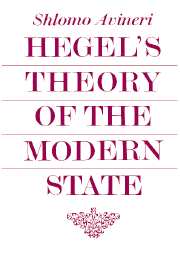Book contents
- Frontmatter
- Contents
- Title in the Series
- Preface
- 1 Beginnings
- 2 Positivity and Freedom
- 3 The Modernization of Germany
- 4 The New Era
- 5 Modern Life and Social Reality
- 6 The Owl of Minerva and the Critical Mind
- 7 The Political Economy of Modern Society
- 8 Social Classes, Representation and Pluralism
- 9 The State – the Consciousness of Freedom
- 10 War
- 11 The English Reform Bill – the Social Problem Again
- 12 History – the Progress towards the Consciousness of Freedom
- Epilogue
- Bibliography
- Index
9 - The State – the Consciousness of Freedom
Published online by Cambridge University Press: 05 June 2012
- Frontmatter
- Contents
- Title in the Series
- Preface
- 1 Beginnings
- 2 Positivity and Freedom
- 3 The Modernization of Germany
- 4 The New Era
- 5 Modern Life and Social Reality
- 6 The Owl of Minerva and the Critical Mind
- 7 The Political Economy of Modern Society
- 8 Social Classes, Representation and Pluralism
- 9 The State – the Consciousness of Freedom
- 10 War
- 11 The English Reform Bill – the Social Problem Again
- 12 History – the Progress towards the Consciousness of Freedom
- Epilogue
- Bibliography
- Index
Summary
THE HIEROGLYPH OF REASON
Any discussion of Hegel's theory of state proper has to contend with a prevalent built-in preconception holding that Hegel advocated an authoritarian, if not outright totalitarian, form of government. The preceding chapters have attempted to show how far from the truth such a simple-minded explication of Hegel's political theory is. Now that we arrive at the core of Hegel's theory of the state proper, as expounded in the Philosophy of Right, a further caveat should be registered about the construction of Hegel's statements regarding the role of the state.
Of Hegel's statements the one which perhaps more than any other has been responsible for creating the above-mentioned preconception appears in the addition to § 258. In the original German it reads as follows: ‘Es ist der Gang Gottes in der Welt, dass der Staat ist.’ This has been variously rendered into English as ‘The State is the march of God through the world’, ‘The existence of the State is the presence of God upon earth’, or ‘The march of God in the world, that is what the state is’.
The implications are clear, yet none of these translations is adequate. Hegel's German syntax is undoubtedly slightly curious in this sentence and this may be attributed to the fact that the sentence comes from an ‘addition’, i.e. from a text not included in Hegel's own edition of the Rechtsphilosophie, but added by his posthumous editor, Eduard Gans, from notebooks of students who attended Hegel's lectures.
- Type
- Chapter
- Information
- Hegel's Theory of the Modern State , pp. 176 - 193Publisher: Cambridge University PressPrint publication year: 1972
- 1
- Cited by

